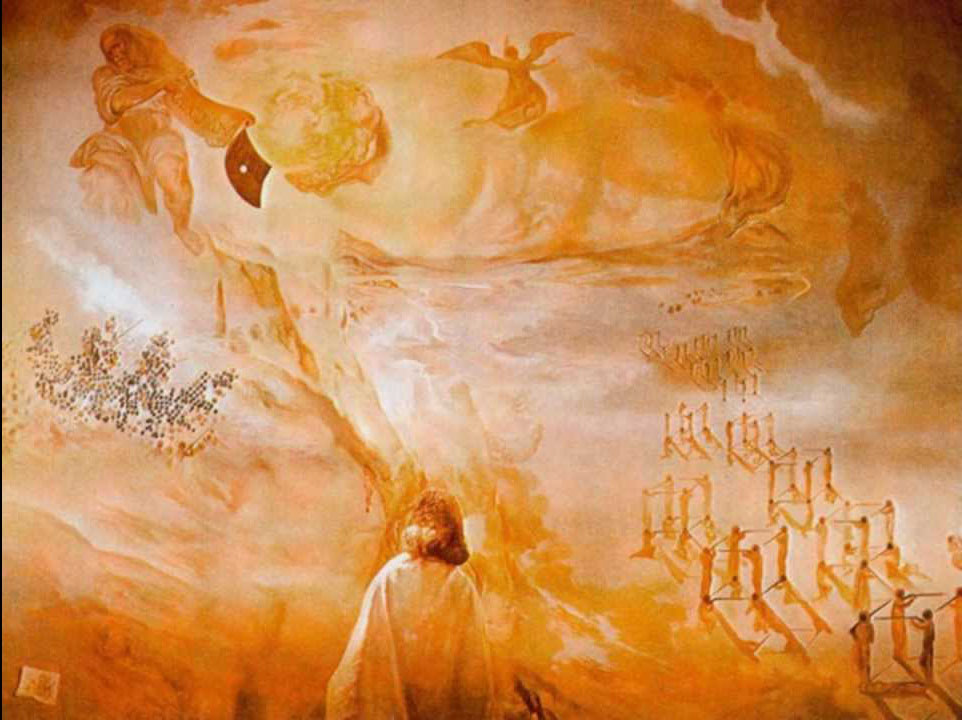
*
It is a world of poets and their dupes.
*
Man is an animal who gets lost in his own ideas.
*
Civilization is the knowledge of a collective illness. The doctors themselves are sick. It is because they provide a cure that they are the most hated.
*
No tradition to return to. No clear way ahead.
*
The pride of confusion is the spirit of our time.
*
In the lie of equality behold your doom.
*
The ordinary man’s life has become a suicide instruction manual.
*
Today most have neither community nor solitude.
*
So deep is their delusion they take submission for virtue.
*
The virtues we lack most today are sincerity and courage.
*
What our age lacks in courage it vainly tries to make up for with deceit.
*
Just experience must be a test of conviction.
*
To live a just life we must constantly examine our motives.
*
History is a wicked punishment.
*
The history of mankind is a history of despair.
*
Despair is a symptom of awareness.
*
Belief is more important than truth, for the mind is essentially an activity.
*
Titles mean more in the world than merit itself because for most people merit is nothing but a means to titles.
*
Where all the world is righteous, be assured there is a will to punish.
*
The media is a secular Satan, an unending will to punish. The public needs its Satan very badly, lest it not be diverted.
*
Each click refreshes our estrangement, offering a newly infinite loneliness in which to wander.
*
Institutions—though made up of dwarfs—are able to crush giants, that is, unique and superior individuals.
*
Progress always culminates in selfish depravity, the true heaven of mankind.
*
God, having become sick of mankind, has given His creation over to cruel satirists.
*
Happiness is mostly a functional idea. It gives us something to hope for and pursue. Meanwhile we are enduring.
*
If we did not suffer, we would have no reason to hope for happiness. If we had no reason to hope for happiness, we could not go on.
*
The saddest truth is only for the strong.
*
Do not inquire too far unless you are willing to be a philosopher.
*
How safe are we? Well, how strong are our illusions?
*
Where people once feared God, they now fear the other ’s knowledge of their deep insincerity.
*
In our time, a great man is like God: probably he does not exist, and if he does, none can see him.
*
There are whole generations stalked by the errors of the past, which many defend as wisdom and virtue.
*
A vague and persistent sense of guilt, born of the nagging awareness of living a dishonest life.
*
Democracy was the worst thing that ever happened to great men. Still, democracy never would have been if there had been more great men and if the great men had been greater.
*
Inegalitarian societies, by having a ruling class whose conduct is a model and, what is more, a standard for others, are much better at producing great men than democracies, whose leveling character is marked by crass interests and commercialism. The Founding Fathers valued honor. We do not even know what honor is.
*
With wealth comes decadence, and thus a greater allowance for the natural tendency to delusion: tragic reality becomes a scandal we cannot abide.
*
Our ignorant epoch will hear nothing of tragedy, for tragedy is universal, and does not make a villain of any particular race or gender.
*
If journalists, like all of us, are not bothered by their own biases, the reason is that moral value is prior to the perspective from which events are perceived. It is perfectly natural, and therefore constantly happens unawares, that events are in effect merely occasions for the will to evaluate.
*
Optimism, like lies, never goes out of fashion.
*
First the expectation of happiness. Then its pursuit in the form of another person. Lastly the painful knowledge of having been wrong-headed all along.
*
As through hard experience we gain knowledge, we learn that contradiction, conflict, and ambivalence are not problems so much as realities, aspects of what we are.
*
The will is weaker than the head. Therefore living wisely is much more difficult than acquiring knowledge.
*
Tone corresponds to the primordial will, to what we are in the deepest sense, and hence why it is so rich and mysterious.
*
Political thought is a question of self-honesty. The rare person who is exceptionally honest with himself concerning his character has a different perspective than most. Profound self-examination precludes utopianism.
*
The politician is well compensated, for the cheap delusion he provides is most costly to himself.
*
The person who, after many years, wakes up one day and admits to himself, “All this time I have not known what I was doing, all this time I have lived in error,” differs from his fellows in that he does wake up.
*
The falseness within the self compared to the falseness within others: The latter bothers us from the beginning since we sense it may thwart our ends; the former bothers us once we experience pain as we seek to obtain our ends in our relations with others: and it is just here that we become even more adroit actors.
*
Because we fear others but not ourselves we fear lying to others but not to ourselves.
*
It is because of our unhappiness that we idealize both the past and the future. Anything but this now, we feel.
*
Our point of view comprehends what we are.
*
The eye sees what the body feels.
*
Feeling is value revealed.
*
It is in the nature of human reason to serve the unreasonable.
*
Men and women are partners in an antagonism.
*
Our hopes are more difficult than we understand, and this is to our benefit.
*
To live in harmony is to have mastered the contradictions that make us what we are.
*
Forever criticizing the politicians, the people are happily forgetful of the evil they share with their detested leaders.
*
To see just how unfree you are, introspect your thought processes. Notice how often thoughts and desires come utterly unsummoned. Now consider that all other people are subject to the determinism, but have quite different thoughts and desires. Why it is not stability but discord that characterizes the world should become manifest and nothing to wonder at.
*
It is freedom—the thing we want most—that most harms us today.
*
The ease and constancy with which bad ideas spread in our digital era: an epistemologist’s nightmare.
*
People are vehicles of ideas that they may or may not understand. A truth that entails certain tragedy.
*
Evil is marked less by deeds themselves than by the refusal to recognize their character.
*
The human eye can convey more evil than any word or deed.
*
First the death of vain speech, then the test of what one is.
*
Expect little, get less, learn more.
*
Time is a twenty-year-old slut playing chess.
*
From all that vanity and all that chase, in which she is so powerful, to finally lying on her back screaming and carrying on like a crazed animal: equality indeed.
*
Multiculturalism: farm animals who each have a different Idol. So that before long they destroy the farm.
*
God is a devil whose goodness frightens us away from our own monstrosity.
*
“Listen to me,” says woman to man. “Listen to me,” says man to woman. And so neither is heard.
*
A psychologist created a couples therapy group for poets. Over drinks and delicacies, the men and women discussed their problems. And on less soporific nights, they managed to discuss their marriages.
*
The trouble with our age of instant gratification is that disenchantment comes too soon. Unlike in the past, we are not sufficiently diverted from recognizing the illusion of fulfillment.
*
There is a common moralistic delusion that character tells us a great deal about a person’s intellectual ability. This is essentially prejudice imposed on situations—the effect of an evaluative drive.
*
Self-reliance and selfishness are quite different things, and the former shall become more common in our selfish era, people learning that others cannot be relied on.
*
People spend their lives in mad pursuit of a happiness they are unlikely to obtain. Still, without that diversion they would be even more unhappy.
*
Character drags the ego around. Behold the pride of an ass.
*
To grasp a person’s character, observe him when he is without fear.
*
Lovers of equality make idols of those who purport to realize their interests.
*
My contemporaries have much to learn from spam email, which, though merely instrumental, does at least show itself for what it is.
*
The worker bees set themselves on fire. Thus they were reminded that they exist.
*
At least a little suffering as mercy, to distract us from our boredom.
*
It is human psychology that makes politics so fundamentally impossible. You cannot change how people, with their own interests, want to understand the world.
*
The belief that they have no illusions is the illusion of philosophers.
*
Politics always is a disaster and nature itself is the reason.
*
Men fight free to destroy themselves.
*
The rules of the game have been lost. Now what? We live in error and confusion. And this we call virtue.
*
Irrational suffering to arrive at better, rational ideas: that is what is needed.
*
We all prostitute ourselves in the marketplace, so we must all use protection: not say the truth, unless it is what people want to hear, which, like a fair marketplace, they do not really want.
*
A standard of taste as political criterion: People without a taste for poetry may vote but not hold office. Our leaders must comprehend a higher degree of civilization.
*
The more we strive to be fair, the more we should expect conflict in response.
*
Prophets are commonly authoritarian, as if this world were so perverse that even the loftiest good must be marred by the stuff of its opposition.
*
The professors began to chatter, and I wondered how a man could remain upright without a spine.
*
The function of professors is to destroy common sense. That is their original contribution to scholarship.
*
He overcome an illusion, only to return to it later in gratitude.
*
Each is half-right, but since they hate each other, mutual understanding remains elusive.
*
Never before have people made so much of equality; never before have people been so uncompromisingly self-interested.
*
“I am a victim,” says an ambitious team member. “I too,” adds another. And this goes on until, having tried to raise everybody up by leveling everybody down, actual victims are produced.
*
In groups speech is especially whorish, nor is there ever enough world and time to prostitute oneself.
*
The value of loathing others: it makes putting up with ourselves less loathsome.
*
Successful relationships require compatible illusions.
*
“Society”—an abstraction that obscures agency for resentment’s sake.
*
The young do not know what they want, but are full of enthusiasm. The old find that their wants were not worth the trouble, but still want to be young again.
*
The most burdensome thing about human life is that, unlike the other animals, we understand ourselves, at least some of the time.
*
In history the most vital relationships have depended on customs born of need and fear. When those customs are replaced by individual autonomy, selfishness eventually undermines social cohesion. Liberated from traditional customs and constraints, people now experience the freedom of inconstancy and confusion. Depending on each other means being subject to neverending inconstancy and foolish expectations. In time, love fades for freedom’s sake.
*
Just guilt presupposes awareness of and a sincere desire for the good. Needless guilt is the idol of the weak, of the person who wants neither freedom nor equality, but only to obey.
*
Spirit of the age: You are not required to be successful at self-promotion, but neither can you desist from it.
*
Where there are many, there shall be much deceit, albeit under the veil of virtue.
*
Having lied to yourself about what you are, you become ready to liar to others, and thus fit for society.
*
By society, we usually mean those people who do not matter to us; by family and friends, those who sustain our illusions, and who therefore matter most of all.
*
If we find the truth about ourselves more fascinating than fiction, the reason is that we live much of the time in error and lies.
*
What is behind all this deception? And why is there so much of it? What is more significant: the vileness it is best not to perceive.
*
Because we are always changing, we never fully know ourselves. We are a process, and self-awareness is belated.
*
There is no one the world despises more than the honest man.
*
“Come, says the world. Follow me on my path.” And because people are committed to appearing virtuous, following is just what they do.
*
We justify life itself by our ideas. Therefore, there is nothing worse than living a life we do not believe in.
*
We spend all life having and recalling mistaken ideas of others, ideas which we believe to be true. Even when we do understand other people, what we have is an idea shaped by our own point of view, experiences, values, and interests. It is our very selfhood that makes understanding others so difficult.
*
One should be wary of all moral beliefs in politics, because the lofty talk is usually a means to manipulation. Even when people are well meaning—motivated by sympathy for the poor, for example—moral beliefs often serve to obscure incompatible ends, values, and interests. Hence it happens that where a discussion about tradeoffs is needed, the mind is content to repose on its ignorant righteousness.
*
Fair life certainly is not, yet the rich hardness of this truism makes for a deepening understanding as the years increase, since it is one of those truths we have often to remind ourselves of, it being so painful that it is difficult to keep in view, even as experience confirms it more and more. There are truths so consequential that, although we know them and have done so for long, still we must, by acts of will, remind ourselves of them, bringing them closer to ourselves, in all their terrible force, so that our dark knowledge is continually augmented.

